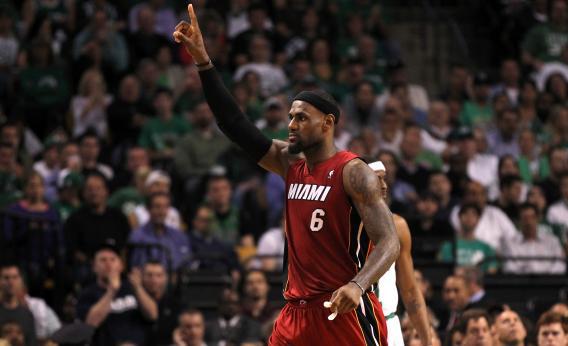LeBron James’ critics had a lot to criticize after the Miami Heat’s four-point loss in Game 5 of the Eastern Conference Finals. Yahoo’s Adrian Wojnarowski raged at James’ “absence of malice over losing,” slamming the star for his contention that “we played good enough to give ourselves a chance to win.” Over at ESPN.com, Brian Windhorst wrote that the Celtics had “completely outclassed the Heat” since Miami’s Game 1 win. “James is playing well (averaging 32 points and 11 rebounds) but not great,” the professional LeBron chronicler continued, that tossed-off parenthetical suggesting that Windhorst’s bar for greatness hovers somewhere in outer space, orbiting the planet on which Michael Jordan defeated the Monstars in Space Jam.
In Game 6, LeBron grabbed that bar and spiked it into the TD Garden parquet. On a night when the Heat had to win, in an arena where Miami had lost 15 of 16 games, against a Celtics team that had humiliated him in 2010, James made everyone else on the court irrelevant. After missing his first shot, James knocked down his next 12. When he took his talents to the bench with three minutes to go, James had 45 points—14 more than Ray Allen, Kevin Garnett, and Paul Pierce combined—and the Heat were warming up their charter plane to go back to South Beach for Saturday’s Game 7.
It shouldn’t take a 45-point, 15-rebound, five-assist game to confirm LeBron James’ greatness. In fact, Thursday night’s exhibition of midrange marksmanship was a better demonstration of what makes Kobe Bryant great than why James is the NBA’s best player. LeBron was shooting so well in Game 6, knocking in fallaways and threes and absurd bankers, that he had no reason to include his teammates. This was Kobe-esque—a monomaniacal, isolationist effort in which the star posts, reposts, turns, and shoots. When you’re this good, why would you ever want to pass the ball?
But LeBron James wants to pass the ball. His bucket-making, teammate-including performances at the tail end of the Pacers series and in the first five games against Boston were more classically James-ian, a blend of selfishness and unselfishness that stuffs stat sheets but makes hoops pundits uncomfortable. James understands that 45-point games are outliers—that he’s at his best when he’s working with his teammates, and not just working while they watch. If you’re a great scorer who passes the ball to open teammates, they’ll say you lack a killer instinct. If you demand the ball and never give it up, they’ll call you a killer, a closer, a hero. But LeBron knows that hero ball doesn’t work in the long run.
Brian Windhorst’s casual dismissal of James’ numbers from Games 1-5—those 32 points and 11 rebounds per game—was less a substantive critique of his approach to basketball than a front-runner’s lament. Miami’s 3-2 series deficit was an outcome in search of a narrative. The Celtics won on Tuesday night, wrote Windhorst and a gaggle of others, because they “outhustled” the Heat, beating the supposedly more athletic Miami team to loose ball after loose ball. The bounce of the ball is never random. If a team loses, it’s because it didn’t try hard enough. Where’s the effort? Where’s the heart?
James and his Miami teammates brought this stupidity on themselves. When he declared at the team’s post-Decision pep rally that the Heat would bring home “not five, not six, not seven” titles, James set the bar for success higher than even Windhorst would have dared to. As the Heat alternately take one step forward and one step back from their self-imposed, if-you’re-not-first-you’re-last mission, assessments of James’ game and psyche swing wildly. “LeBron James experiment teeters on collapse,” Wojnarowski wrote after Game 5, a contest in which LeBron notched 30 points and 13 rebounds, only to see the Heat lose by four after Paul Pierce drained a killer three with less than a minute to go.
This day-to-day sine curve of opinioneering gets LeBron James exactly wrong. What makes him great is his consistency. James has scored no fewer than 29 points in the six games against the Celtics. Pierce, meanwhile, followed up his Game 5 heroism by shooting 4-for-18 from the field in Game 6. Rajon Rondo, who nearly matched James by scoring 44 points in Game 2, went 3-for-15 in Game 5.
The greats aren’t always great. LeBron James usually is, and sometimes his team loses anyway. That’s how basketball works—when you play well enough to give yourself a chance to win, that chance doesn’t always come through. Maybe the Heat will lose on Saturday. And if they get past the Celtics, maybe they’ll lose to Oklahoma City in the Finals. James doesn’t need to recreate Game 6 for Miami to have its best shot to win. He doesn’t need to be a killer, or a closer, or a hero. He just needs to be himself.
